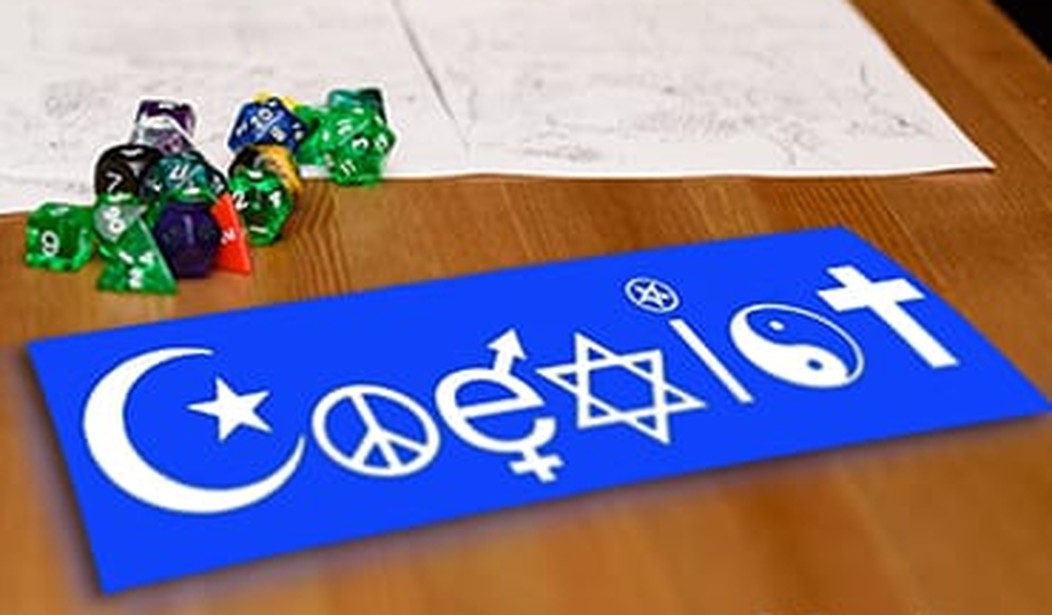A while back I wrote a bit here about whether or not to use true-life religions in your role-playing game (RPG); but it occurs to me that there’s more to be said on the subject of religions in RPGs in general. A lot of stuff written on said subject tends to focus on the need to be sensitive in the way you portray religion, which is of course excellent advice… if you haven’t already worked that out for yourself. If you have, and have decided to be sensitive or insensitive as it pleases you, then perhaps you may want some more practical advice?
Traditionally, gods in RPGs serve the gamemaster (GM) in one of three ways: to throw obstacles in the player-characters’ (PCs) way, to tilt the field in the PCs’ favor, or to act as a magical power source (both regular and emergency) for the party’s clerics*. These are all legitimate tools in the GM toolbox; but often they’re used in a way that concentrates on the adventuring party as a self-contained unit, instead of being part of a larger game world. Luckily, having outside ‘reality’ intrude on the adventuring party’s lives can be done just as easily using gods as anything else.
For example: it’s easy enough to have a god get angry at the party and take it out on them by sending a thunderstorm or a battle servant of the god (it’s amazing how many gods have battle servants, including the supposedly nice ones). But what if the god is not angry at the party, but is instead angry at a particular town that the party can’t avoid, or loathes a specific species of monster that the party has to bring back alive, or is about to go to Holy War with another god (neither of which is represented in the party’s theological makeup)? Personal attention from an angry activist deity is very rough, but at least you know that the deity in question is listening, if only for your screams for mercy. A god who got a little sloppy when wiping out some random mountain bandit lair may not be as easy to get in touch with, even if you’re one of the people in the path of the avalanche.
Divine Aid is a little trickier. Do you go with a minimalist style, where a petitioning PC cleric gets what they need instead of what they prayed for, and where the gods never bother to show up in person for anyone under 20th level? Or do you go more gonzo, where various gods regularly try to poach high-status, high-reputation, or simply high-level characters to be celebrity worshipers? Either way has its points, although the latter method is more conducive for fairly broad humor. Whichever you choose, consider this: it’s perfectly reasonable to assume that a divine magic-casting cleric of an active god is in good favor with his god, and will like what the god likes, and hate what the god hates. Therefore it’s perfectly reasonable to try to get the cleric to intercede on a petitioner’s behalf, particularly if the petition is indeed something that the god would look upon with favor. You can make all sorts of plots out of this.
Speaking of petitions and petitioners, here’s something to remember about priests of a god: they signed up to serve. Better yet: thanks to their habit of regularly drawing on Divine power in order to create miraculous effects, the average cleric is constantly establishing their current location. So, let’s say a god suddenly gets a prayer from some peasant asking to be saved from the four wolves that have treed him. The deity knows that not a quarter-mile away is one of his priests. Surely he and his friends can dispatch four wolves on their own, yes? And indeed, they probably can. But the more powerful the priest gets, perhaps the harder the jobs he can get thrown to him ‘because he’s right there.’ It doesn’t have to be a series of elaborate deathtraps; the god may simply want somebody already there to make a preliminary report and give some on-the-spot advice. The point is that the relationship between a RPG cleric and his deity can totally be a two-way street.
One last note: if given the chance, adventuring parties will often attempt to use gods as literal deus ex machinae and try to solve all their problems via the use of Divine intervention. Assuming that you mind simply letting them (you can get away with a lot in a comic campaign), consider: there has to be some reason why activist deities in your world don’t run around solving everyone’s problems for them. Figure out what that reason is. Enforce it, nicely but firmly. And don’t feel bad if the players ignore it, then get turned into toads for their sacrilege. You can always turn them back later.
*Gods in RPGs stereotypically serve the players as a handy excuse, but that’s a whole different article.









Join the conversation as a VIP Member